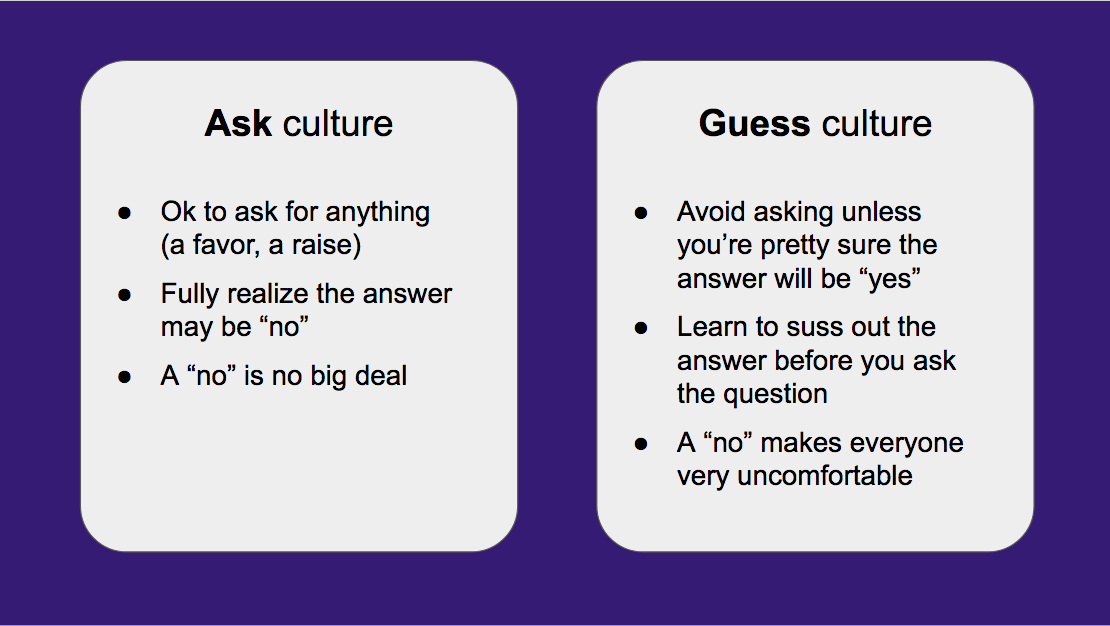Be an "asker", not a "guesser"
Note: This is part 3 of a series from my "What is Empowerment?" presentation at Google's Women in Tech conference in March 2018.The idea of asking for what you want sounds so simple, but can be so difficult to put into practice. People who have no qualms about making requests seem almost foreign to me, and there’s a reason for that - there actually is sort of a divide that places people into one of two camps: Askers vs Guessers.I first read about this in an article called This column will change your life - aptly-named because this really did change the way I think about myself. The idea is this (semi-quoted from the article above):
In Ask culture, people grow up believing they can ask for anything – a favor, a raise – fully realizing the answer may be no. And if the answer is no, that’s no big deal.On the other hand, In Guess culture, you avoid "putting a request into words unless you're pretty sure the answer will be yes...and if you ask something that does get a “no” response, it’s a very uncomfortable situation for all involved.
 Neither of these necessarily wrong, and there is a spectrum, but it's safe to say that business culture is pretty "Ask"-oriented. And, I’d wager that in general, men are socialized to be more on the “ask” end of the spectrum, and women are socialized to be more on the “guess” end. (I definitely grew up in a "Guess" environment.)Here’s one example of “guess” behavior that I can relate to. How many of us have been in a situation like this one (I know I have)?
Neither of these necessarily wrong, and there is a spectrum, but it's safe to say that business culture is pretty "Ask"-oriented. And, I’d wager that in general, men are socialized to be more on the “ask” end of the spectrum, and women are socialized to be more on the “guess” end. (I definitely grew up in a "Guess" environment.)Here’s one example of “guess” behavior that I can relate to. How many of us have been in a situation like this one (I know I have)?
- You're negotiating pay
- You want to, for example, charge $100 per hour
- ...but you think that they want to pay you $50 per hour
- ...so you ask for $75 per hour, because it seems like something they may be able to say yes to.
For years, I didn’t even consider whether that was a standard way to enter a negotiation, because it was so ingrained in me to look for the "yes" before asking. I went along like that until a friend of mine (a man) said, “if you tell a prospective client your rate and they don’t say, 'ooooooh, I don't know,' you didn’t ask for enough.”This idea has been confirmed with other close (mostly male!) friends - one who often goes into salary negotiations asking for raises that seem extremely, exorbitantly, even offensively high to me - say, asking for a 50% raise when I would only have asked for 10% at most. The truly shocking thing is that, most of the time, the answer comes back as something like, "We can't do 50%, but we can give you a 20% raise and a 15% bonus".How much money had I been leaving on the table?!?!Businesses *expect* to negotiate ("Ask" culture!), but the idea of having those interactions made me extremely uncomfortable, because I was - without even realizing it - doing everything I could to avoid a “no”. The idea certainly isn't to price-gouge anyone - it's just to come to the table with the confidence to ask for what your work is worth, instead of undercutting yourself just to avoid a difficult conversation. I started wanting to change my behavior, but as a lifelong "guesser" who was pretty good at knowing which questions I could get a "yes" to, I was honestly unsure what to do if I got a “no” response. Was I supposed to be apologetic and say, “Oh, you’re right, I'm so sorry I asked”? Or go to the other end of the spectrum with, “Well then, forget about it, the deal's off”? Or what?For me, the best way to move closer to the “Ask” end of the spectrum turned out to be simply committing a few key phrases to memory, and rehearsing them until I had my delivery down cold. In the next post in this series, I'll cover a few of my go-to 'lines' for getting through intimidating interactions successfully.
I started wanting to change my behavior, but as a lifelong "guesser" who was pretty good at knowing which questions I could get a "yes" to, I was honestly unsure what to do if I got a “no” response. Was I supposed to be apologetic and say, “Oh, you’re right, I'm so sorry I asked”? Or go to the other end of the spectrum with, “Well then, forget about it, the deal's off”? Or what?For me, the best way to move closer to the “Ask” end of the spectrum turned out to be simply committing a few key phrases to memory, and rehearsing them until I had my delivery down cold. In the next post in this series, I'll cover a few of my go-to 'lines' for getting through intimidating interactions successfully.
